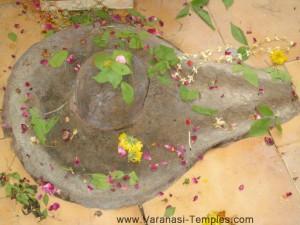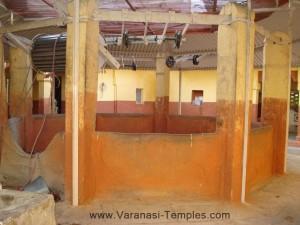Varanasi, also known as Kashi, is a holy city in the northern Indian state of Uttar Pradesh. It is one of the oldest continuously inhabited cities in the world, with a rich cultural and religious heritage. One of the most revered temples in Varanasi is the Dhanvantari Temple, dedicated to Lord Dhanvantari, the Hindu god of medicine and healing. This article will provide a comprehensive guide to the Dhanvantari Temple, exploring its history, architecture, and significance.
Dhanvantareshwar Temple, Varanasi Overview
| Date built: | – |
|---|---|
| Deity: | Dhanvantareshwar |
| Architectural style: | Dravidian architecture |
| Major festivals | – |
| Locale: | Varanasi |
| District:: | Varanasi |
| Address: | – |
| Phone | – |

Lord Shiva was relating the various sacred Teerths (Ponds), Koop (Wells), and places of worship in Kashi. Lord Shiva described such places with blissful joy (Kashi Khand, Chapter 97).In the vicinity of Malteeshwar is the Dhanvantareshwar Ling. By worshipping this Ling, the devotee is cleansed of all sins committed by him and the devotee is cured of his diseases. Kashi Khand mentions one Dhanvantareshwar Koop (Well) where Dhanvantari (celestial physician) had dropped various medicines/drugs like Mrit Sanjivini, the elixir which revives the dead ones. The Koop is presently not visible. However, in the near vicinity is Kalodak Koop (Well). The water from the well is capable of curing all diseases. Old-timers believe that Dhanvantareshwar Koop has merged itself with Kalodak Koop.
The Dhanvantari Temple is a must-visit destination for anyone interested in Hindu mythology and Ayurveda. With its rich history, beautiful architecture, and spiritual significance, the temple offers a unique and enriching experience for visitors. Whether you are seeking the blessings of Lord Dhanvantari or looking to explore the cultural and religious heritage of Varanasi, the Dhanvantari Temple is a destination not to be missed.
History
The Dhanvantari Temple was built during the reign of the Maratha ruler, Maharaja Ranjit Singh, in the early 19th century. It is located in the Chowk area of Varanasi, near the Dashashwamedh Ghat, one of the most popular ghats in the city. The temple was built to honor Lord Dhanvantari, the Hindu god of medicine and healing, who is believed to have incarnated on earth to teach humans the science of Ayurveda.
Architecture
The Dhanvantari Temple is a beautiful example of the traditional North Indian style of architecture. The temple is built on a raised platform and has a square plan. The main shrine is located at the center of the temple, and it houses the idol of Lord Dhanvantari. The idol is made of black stone and is depicted with four hands, holding a conch, a discus, a pot of nectar, and a leech. The temple is adorned with intricate carvings and sculptures, depicting scenes from Hindu mythology.
Legend / Local stories
According to Hindu mythology, Lord Dhanvantari was the physician of the gods and was responsible for imparting the knowledge of Ayurveda to humans. He is believed to have emerged from the churning of the cosmic ocean, holding a pot of amrita, the elixir of life. He is also worshipped as the presiding deity of Ayurveda, the traditional Indian system of medicine.
The rituals and festivals at the Dhanvantari Temple
The Dhanvantari Temple is a popular destination for devotees seeking the blessings of Lord Dhanvantari. The temple is open from 5:00 AM to 12:00 PM and from 4:00 PM to 9:00 PM every day. The daily rituals at the temple include offering prayers, aarti, and the distribution of prasad to the devotees. The temple also celebrates several festivals throughout the year, including the Dhanvantari Jayanti and Diwali.
The significance of Ayurveda in the Dhanvantari Temple
The Dhanvantari Temple holds immense significance for followers of Ayurveda, as it is dedicated to the god who is considered the father of this ancient system of medicine. The temple hosts several Ayurvedic clinics and centers, where visitors can receive traditional treatments and therapies. The temple also organizes workshops and seminars on Ayurveda, providing a platform for practitioners and scholars to exchange knowledge and ideas.
Photo Gallery

How to Reach:
Dhanvantareshwar is located at K-52/39, on the premises of Mrityunay Mahadev temple. People can approach this temple by rickshaw through Bisheshwarganj/GPO.
The Dhanvantari Temple is located in the Chowk area of Varanasi and is easily accessible by road. The nearest airport is the Lal Bahadur Shastri International Airport in Varanasi, which is located approximately 20 km from the temple.
The nearest railway station is the Varanasi Junction, which is well-connected to all major cities in India. From the airport or railway station, one can hire a taxi or take a bus to reach the Dhanvantari Temple.
Places to visit near the Dhanvantari Temple
Apart from the Dhanvantari Temple, there are several other places of interest near the temple. Some of the popular tourist destinations in Varanasi include the Kashi Vishwanath Temple, the Sarnath Stupa, and the Manikarnika Ghat. Visitors can also explore the narrow lanes and bazaars of the old city, which offer a glimpse into the rich cultural and culinary heritage of Varanasi.
Accommodation near the Dhanvantari Temple
There are several accommodation options available near the Dhanvantari Temple, catering to all budgets and preferences. Visitors can choose from hotels, guesthouses, and homestays, depending on their requirements. Some of the popular hotels near the temple include the Rivatas by Ideal, the Hotel Alka, and the Hotel Ganges Grand.
Best time to visit the Dhanvantari Temple
The Dhanvantari Temple can be visited throughout the year, but the best time to visit Varanasi is between October and March, when the weather is pleasant and cool. The city is also home to several festivals and events during this time, including Diwali, Dev Deepawali, and the Kumbh Mela.
Tips for visiting the Dhanvantari Temple
Visitors to the Dhanvantari Temple are advised to dress modestly and remove their shoes before entering the temple premises. It is also recommended to carry a water bottle and sunscreen, as the temple can get crowded and hot during peak hours. Visitors should also be respectful of the customs and traditions of the temple and avoid causing any disturbances or disruptions.
FAQs
The Dhanvantari Temple is dedicated to Lord Dhanvantari, the Hindu god of medicine and healing, and is considered a sacred abode of Ayurveda.
The Dhanvantari Temple is open from 5:00 AM to 12:00 PM and from 4:00 PM to 9:00 PM every day.
The Dhanvantari Temple celebrates several festivals throughout the year, including the Dhanvantari Jayanti and Diwali.
Some of the popular tourist destinations near the Dhanvantari Temple include the Kashi Vishwanath Temple, the Sarnath Stupa, and the Manikarn

